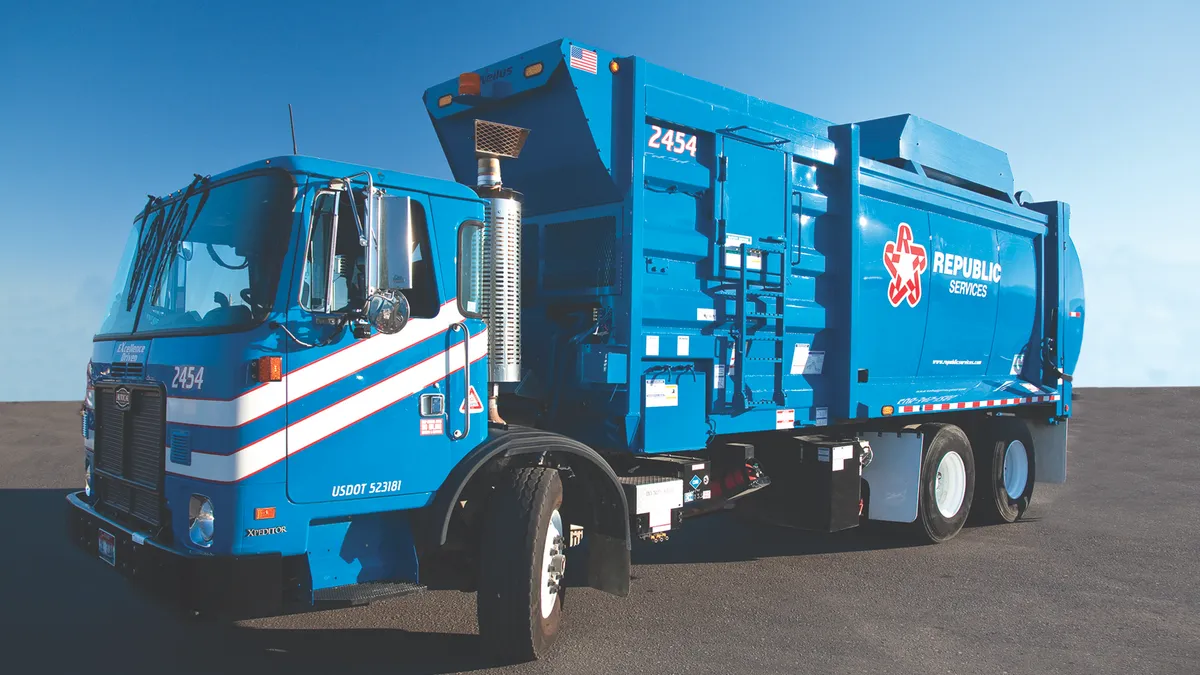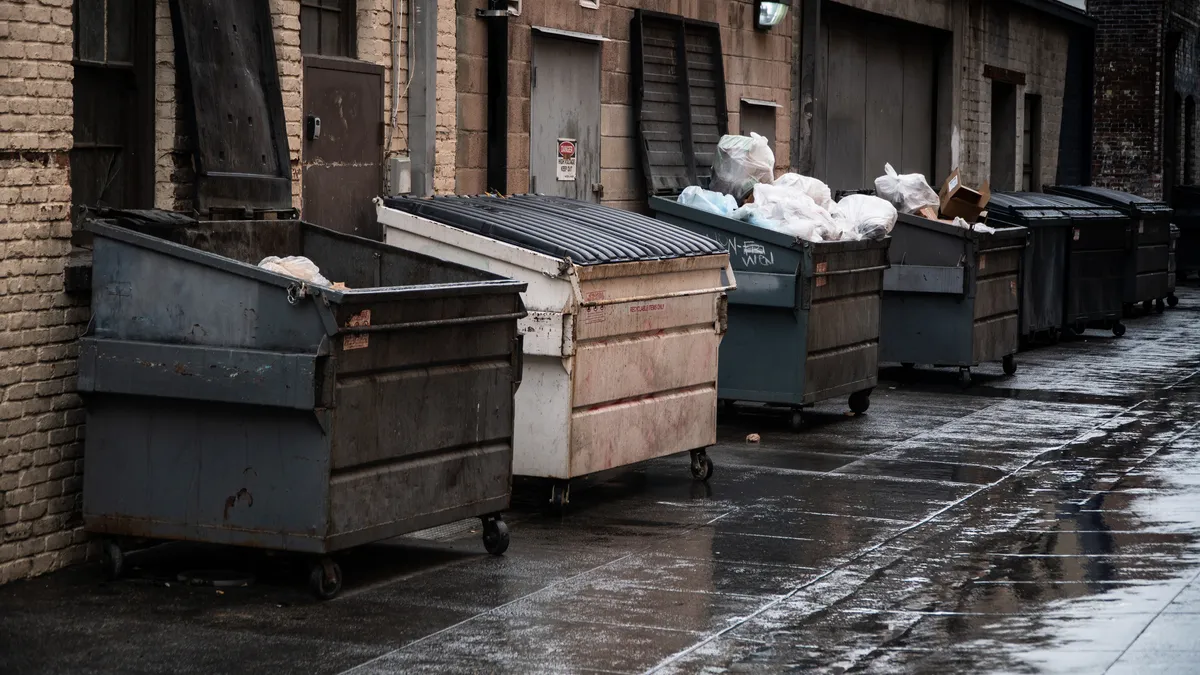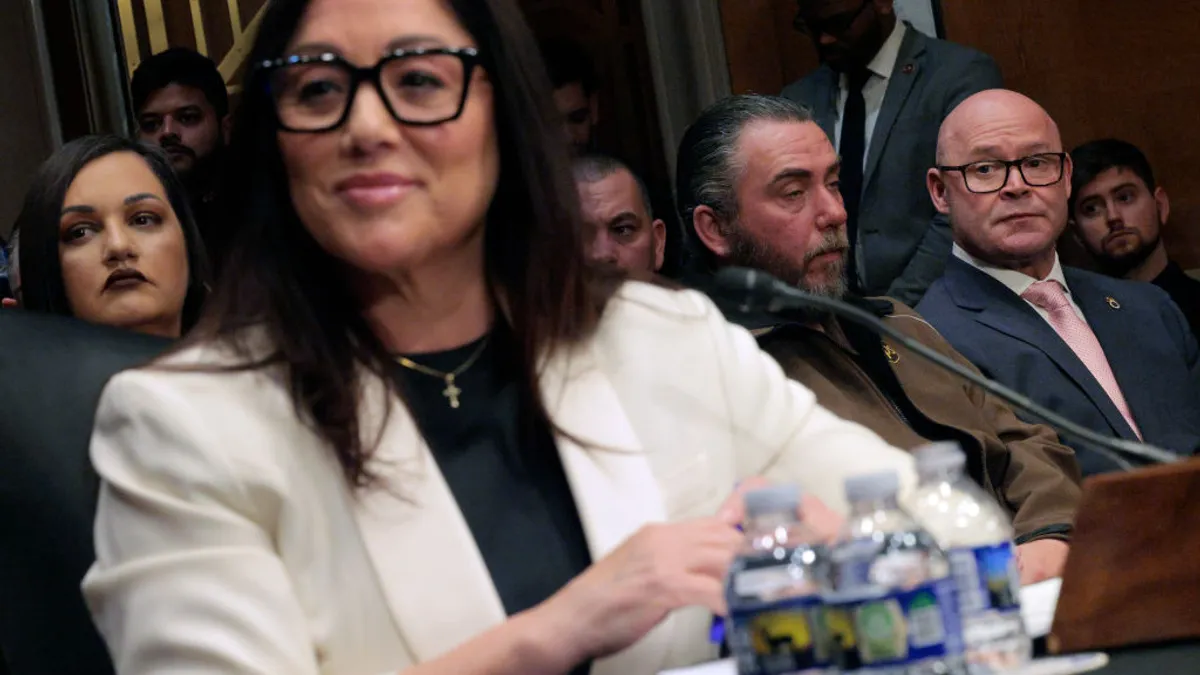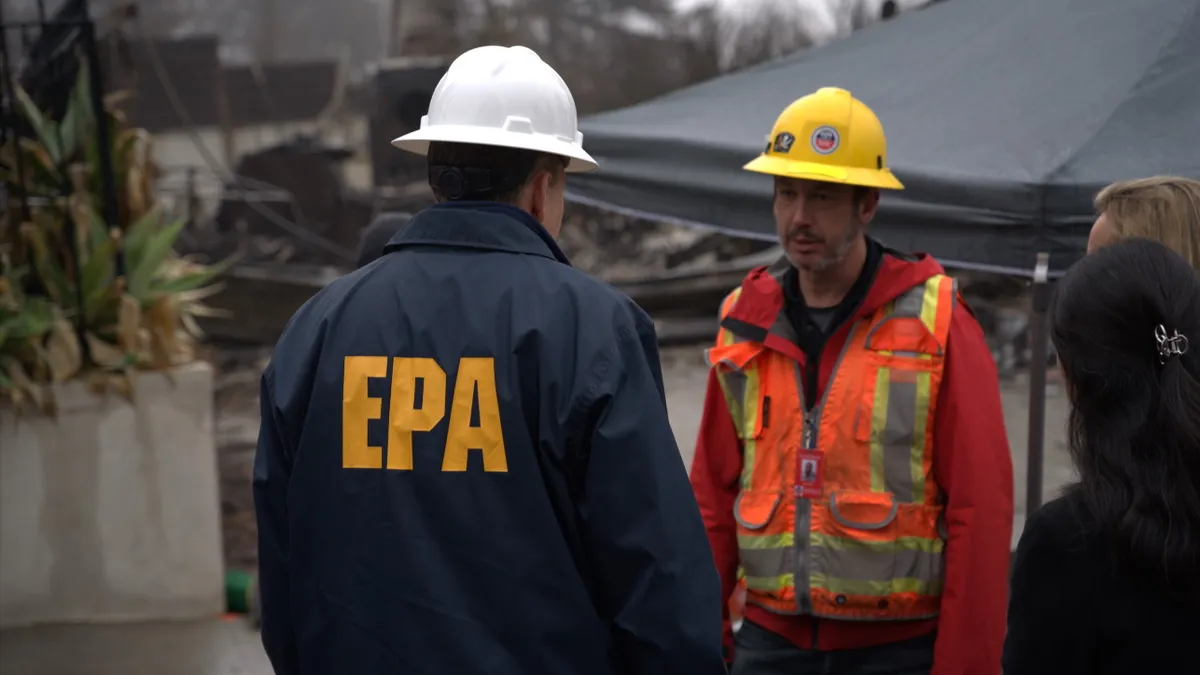Republic Services will start the new year with a new chief operating officer, filling a position that has been open since June 2016.
As COO, effective Jan. 1, Jon Vander Ark will be responsible for "operationalizing the company's strategy and executing its business plan across its field operations," with oversight for safety, engineering, environmental compliance and fleet management.
Vander Ark's previous title was executive vice president of operations. He joined the company in 2013 as executive vice president and chief marketing officer. During his tenure so far, Vander Ark has been responsible for helping establish Republic's brand, advancing customer service strategies, and overseeing operations in both the eastern and western halves of the U.S. Before joining the industry, he spent 12 years as a principal at McKinsey&Company's Detroit office and earned a law degree from Harvard Law School.
With Republic coming off another positive quarterly earnings report, including the news of a $165 million ReCommunity acquisition, the company is projected to keep growing in 2018. Though like others, it will also be dealing with effects from China's scrap import policies, working to address industry-wide safety challenges and looking for ways to economically advance more sustainable practices.
Waste Dive spoke to Vander Ark Dec. 12 to hear more about this plans for the new job.
The following transcript has been edited for brevity and clarity.
WASTE DIVE: How has your consulting background prior to joining Republic been helpful for you in the waste industry?
JON VANDER ARK: I was a consultant for a number of years at McKinsey and got to work with a lot of leading global Fortune 500 companies. I'd say the lesson that I've taken with me the most in our industry is the focus on the customer. So I got to see 50 different industries across about 12 years, and saw the companies that were most successful really put the customer at the forefront of all they did. I think the history of the waste industry is very operations driven. So that's one thing we've worked really, really hard on here over the last five years, and will continue in my new assignment.
Is anything different about customer service in waste than other industries? You deal with individual households, businesses and also local government customers. Does that change the approach?
VANDER ARK: I'd say there are a couple things that make this industry maybe not unique to any other industry, but certainly diverse and challenging. We serve almost everybody. From individual households that we contract with directly, to municipalities and communities, to small business, medium business, national accounts. We serve a broad, broad stroke of the economy and there's a lot of moving pieces.
We pick up the waste and recycling 5.8 million times a day. We're 99.99% good [on service] — which is a fantastic number across any industry — but when you marry that against the number of pickups we have still disappointed a number of customers. So we need to figure out how to become world class in a zero defect environment.
A lot of industry fleets, including yours, have been investing in CNG vehicles. What's next for Republic's fleet plans and how do you see the industry moving beyond CNG to electric or even automated vehicles?
VANDER ARK: So CNG is about 20% of our fleet today. That continues to grow. And I think that CNG will be part of the solution in the short to medium term. I think long-term, electrification holds a lot of promise in terms of powertrain. I know there's been a lot of discussion on autonomous vehicles.
I think it does have potential. I think we are at least a couple decades off. Keep in mind ... we're a relative niche player in the overall development scheme for the heavy truck manufacturers. And we're a complex application. So they'll start over the road first ... We have a pretty demanding application. Lots of stops and starts. Lots of twists and turns, going up and down landfills many times. And so it will take a while for those technologies to go to other parts of the industry and then disseminate into our fleets.
On artificial intelligence, I've also heard from plenty of others that think it's a ways off. Though some think it may be coming sooner than we realize. How do you stay on top of that? Who do you trust to know how rapidly these things are developing?
VANDER ARK: We're connected obviously to the manufacturers closely ... We're certainly a very meaningful customer for our automotive OEMs. We have a fleet group that constantly scans the environment. Then we're connected across industry with other players in safety councils for example, distributed fleets, other people that move. So that's another great way that we stay wired and connected to what's out there.
Safety continues to be a big topic for the industry. The latest Bureau of Labor Statistic injury data shows some progress, but new areas of concern. What are your plans for safety at the company in this new role?
VANDER ARK: Safety is our number one priority, obviously. It's very cultural and core to what we do. I think our latest stats say based on OSHA we're 42% better than industry average. But safety is a unique topic. One incident is one too many and you can only have a goal of zero on that topic. What gets me nervous is the world is getting more complex around us. Distracted driving, for example, is a big, big challenge for us. We're brainstorming with the PepsiCos and AT&Ts of the world to think about how do we get to play a broader industry role with communities to make all of our environments safer.
What about addressing safety challenges at MRFs and landfills, where the public isn't involved but there's still a lot of room for error?
VANDER ARK: Yeah there is. I think again it's making safety our number one priority, which we do. I think the industry in general, historically we've been pretty hauling-centric ... Because the bulk of the employees sit in the hauling side, that's typically where the safety training has gone. More and more of our safety training is getting tailored to those specific environments.
I think on the recycling side specifically, one place we're thinking about is automation and capitalization. How much do we invest on a capital side, which actually takes labor out of the equation? Not eliminates it, but reduces it and puts them in applications which are safer.
Automation does appear to have arrived at MRFs sooner than on the road. Though it's still an expense. How do you make those choices as far as when it's time to invest at a given facility?
VANDER ARK: It's on new facilities or facilities that we do a substantial recapitalization to. We're very much in line of sight to getting the latest and greatest technologies on that side. [Also] some retrofits as we go look across the fleet. Frankly, another driver of this is what's happening with China. As they're demanding a cleaner and cleaner product, that pushes you more toward capital investment to produce a more high quality product out of the back end.
In the short term, a lot of companies have been staffing up and slowing down their lines to meet these standards. I would imagine that puts even more of a safety spotlight on MRFs as more workers are moving through these facilities?
VANDER ARK: In the very short term there's places where, again, we'd have to add a little bit of labor to try to clean up the stream. Especially when we have older facilities with less technology in them. Broad strokes, I think it helps us and gets us safer. Because when we operate in [more] demanding environments that forces us to execute and operate tightly across the line.
On the landfill side there has also been more discussion about safety strategies and Republic recently had the unfortunate fatality of an employee at one in San Antonio. Does that offer any new lessons on how to step up messaging or address safety at those sites?
VANDER ARK: Absolutely. Every one of those incidents is tragic. Our goal is that everyone goes home at night to their loved ones and when one of these things happens we have a safety stand down. Unfortunately, you can't look back. You can look back to remember and honor a life well-lived, but you can't bring the person back.
What you can do is look forward and say, 'What did we learn in this event?' Safety is two things. It's individual action, and did the person make an unsafe choice? But what is the broader environment in which we operate, and are we creating the conditions where people rarely would make an unsafe choice, or never make an unsafe choice because the culture is so strong and demanding around them?
What developments are you seeing in terms of environmental compliance for the company?
VANDER ARK: Landfills are becoming more complex. We're going more vertical on landfills than we ever have before [or was] oftentimes contemplated in the original landfill designs. And the waste stream is changing. So as we drive more and more diversion, and we're growing recycling at a much faster rate than MSW in our company, that's changing the mix that goes into a landfill. You're getting higher and higher special waste streams as a percentage of the overall concentration of inbound tons. So we're seeing elevated leachate levels across the industry.
I think that we need to do a couple things. One, we need to understand the true costs that adds to appropriately treat that leachate and price for those streams. Historically, I think special waste has been more marginally priced and our mindset is that oftentimes should be premiumly priced. So if you have to solidify a waste stream, for example, you want to fully bear the cost of that. Then I think there's room for innovation on the back end of leachate to understand how we treat this.
Any other thoughts on the new role as you head into 2018?
VANDER ARK: I'm very excited to be in the role. We've become far more customer-focused in the last couple years. Focusing on simple solutions, reliability, environmental responsibility. We've got a great set of 32,000 employees who are fired up every day to go do that mission. We're a young company, with a terrific trajectory in my mind. So I couldn't be prouder to be in the seat.























